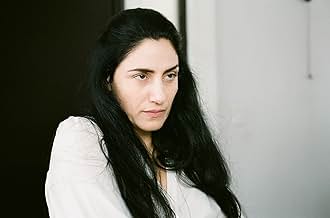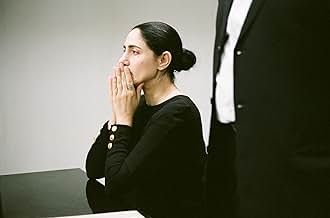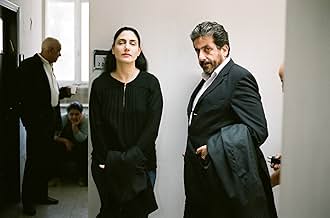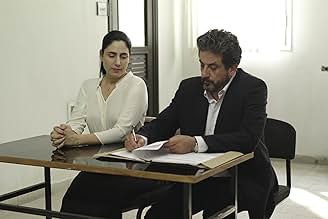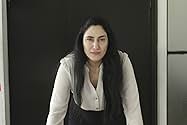Dopo un matrimonio tiepido di oltre vent'anni, una donna fa appello alla compassione del marito per ottenere l'auspicabile documento di divorzio davanti a un tribunale, il che si rivela più ... Leggi tuttoDopo un matrimonio tiepido di oltre vent'anni, una donna fa appello alla compassione del marito per ottenere l'auspicabile documento di divorzio davanti a un tribunale, il che si rivela più impegnativo di quanto si aspetterebbe.Dopo un matrimonio tiepido di oltre vent'anni, una donna fa appello alla compassione del marito per ottenere l'auspicabile documento di divorzio davanti a un tribunale, il che si rivela più impegnativo di quanto si aspetterebbe.
- Regia
- Sceneggiatura
- Star
- Premi
- 15 vittorie e 19 candidature totali
- Rabbi Shimon
- (as Sasson Gabai)
- Head Rabbi Salmion
- (as Eli Gornstein)
- Rabbi Abraham
- (as Roberto Pollak)
- Rachel Amzalleg
- (as Rubi Porat Shoval)
Recensioni in evidenza
Winner of six Israeli Ophir Awards including Best Picture and nominated for a Golden Globe, Gett depicts the interviews and appointments Viviane has with the rabbinical court and the entire film takes place in the cramped courtroom or in the adjacent hallways. Viviane does not appear during the first few minutes as the camera focuses only on the men talking about her. She sits facing the judges and is only visible when she is being reprimanded for speaking without being spoken to. She needs no words, however, to convey the anguish clearly apparent on her face and in her gestures.
Though the trial stretches out for what seems like an endless period of time, the directors stated that similar trials may take three times as long. The dramatization of the extended trial starts and stops as we are notified by intertitles such as "three months later," "two months later," "one year later," and so forth until five years have passed. There are times when Elisha does not show up in court in spite of the rabbi's order and who threatens to revoke his driver's license, cancel his credit cards, and/or send him to jail but to no avail. If a husband refuses to grant his wife a divorce, the rabbis are powerless to force him.
Though Viviane has lived apart from him for four years and claims that they have not spoken during that time, the judges refuse to see that the marriage has gone past the point of no return and look for no solution other than having the couple remain together to try and "work it out." Witnesses are brought in to testify about Elisha being a good man (one calls him a saint) who even lets his wife go out alone. Even witnesses for the plaintiff say that Elisha has a good character. Represented by her articulate attorney Carmel Ben Tovim (Menashe Noy, Big Bad Wolves), Elisha is not accused of cheating, physical abuse, or lack of support, but only that, after thirty unhappy years of marriage, she no longer loves him and that they are incompatible.
While Elisha sits in distant silence, one witness claims that she heard Viviane yelling and throwing things inside the house. At that point Viviane says "It's easy to blame the one who yells. Those who whisper venom are innocent." It often seems as if Viviane is on trial rather than the issue of divorce. Elisha's brother Rabbi Shimon (Sasson Gabai, The Band's Visit) who is representing him, calls her a "wayward" woman and the judge takes offense when she unties the bun and lets her hair fall on her shoulders while another judge chastises her for speaking her mind. Brazenly, Shimon accuses Carmel of being secretly in love with his client and one witness testifies that she saw Viviane in a café talking to a man who was not part of her family.
As the trial drags on, it is clear that Elisha is simply not willing to let go and that he still loves his wife even if he defines it in his own terms. Gett has become a hot-button topic in Israel and is now being vigorously debated in both secular and religious circles. In fact, it mirrors a current case in New York where an orthodox rabbi has been accused of kidnapping husbands to coerce them through beatings and torture to provide a get to their wives. While there are no clear-cut victims and both characters are trapped in a heartbreaking situation, the film is a powerful indictment of archaic religious laws and traditions that make women second-class citizens. In the movie's most compelling moment, Viviane finally explodes in a torrent of rage and frustration, practically begging for her freedom. The rage and frustration is also ours.
Several comments: first, this movie is co-written and co-directed by Ronit Elkabetz (who also plays the role of Viviane) and Shlomi Elkabetz (whom I believe is her real-life husband). Second, 95% of the movie plays out in the court room, and as such is really more of a filmed stage play than it is a movie in the traditional sense. The movie consists is various family members and friends testifying as to why the divorce should, or should not, be granted. Third, most importantly, this movie spotlights the many absurdities of the Israeli court system, at least how it relates to divorce matters. The judges are rabbis and, most appallingly, the true power is held by the husband, who apparently must consent to granting the divorce. Without the husband's consent, not even the court can impose the divorce. In that sense, this movie demonstrates how a husband can abuse his wife psychologically, and there is nothing anyone can do about it. For that reason, I found the movie deeply disturbing, although I am also aware that, sadly, Israel is far from the only country where women are treated in this manner. Bottom line: "Gett: The Trial of Viviane Amsalem" is very much worth seeing, but let the viewer be aware: you may likely be pretty upset about what plays out in this Israeli divorce court drama.
I saw this movie recently at the Silverspot Cinema in Naples, FL. The early evening screening where I saw this at was quite nicely attended, which surprised me, given not only the nature of the movie, but also the theater-like style of the movie. If you are in the mood for a top-notch foreign divorce court drama that will challenge you in more ways than one, you cannot go wrong with this. "Gett: The Trial of Viviane Amsalem" is HIGHLY RECOMMENDED!
Lo sapevi?
- QuizRonit Elkabetz's final film before her death.
- BlooperVivian wears only one big ring on her forth finger of her left hand throughout most of the movie. Somewhere in the middle of the movie, Vivian is shown sitting at the bench in the "court" and there is also a second ring on her second finger.
- Citazioni
Viviane Amsalem: Why are you making me run around in circles? Why, Your Honor? Why? Why have I come in and out for years now and nothing's changed? Why? You can't force him to divorce nor to appear, and you can't this or that, and what about me? When will you see me? When I'm too exhausted to stand before you? When? If it were up to you, it could go on for 10 years. I could drop dead in front of you and all you'd see was him! But nobody is above the law. There's a God and there's justice and He'll judge you as you judge me. Mercilessly. You don't care about me!
- ConnessioniFeatured in 72nd Golden Globe Awards (2015)
I più visti
- How long is Gett?Powered by Alexa
Dettagli
Botteghino
- Lordo Stati Uniti e Canada
- 988.150 USD
- Fine settimana di apertura Stati Uniti e Canada
- 24.210 USD
- 15 feb 2015
- Lordo in tutto il mondo
- 1.259.160 USD
- Tempo di esecuzione
- 1h 55min(115 min)
- Colore
- Proporzioni
- 1.85 : 1




